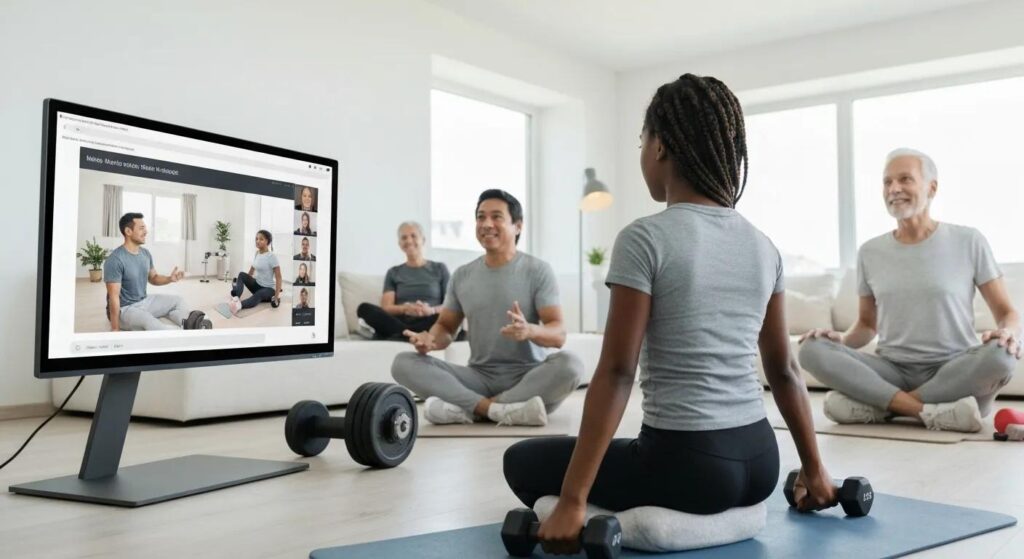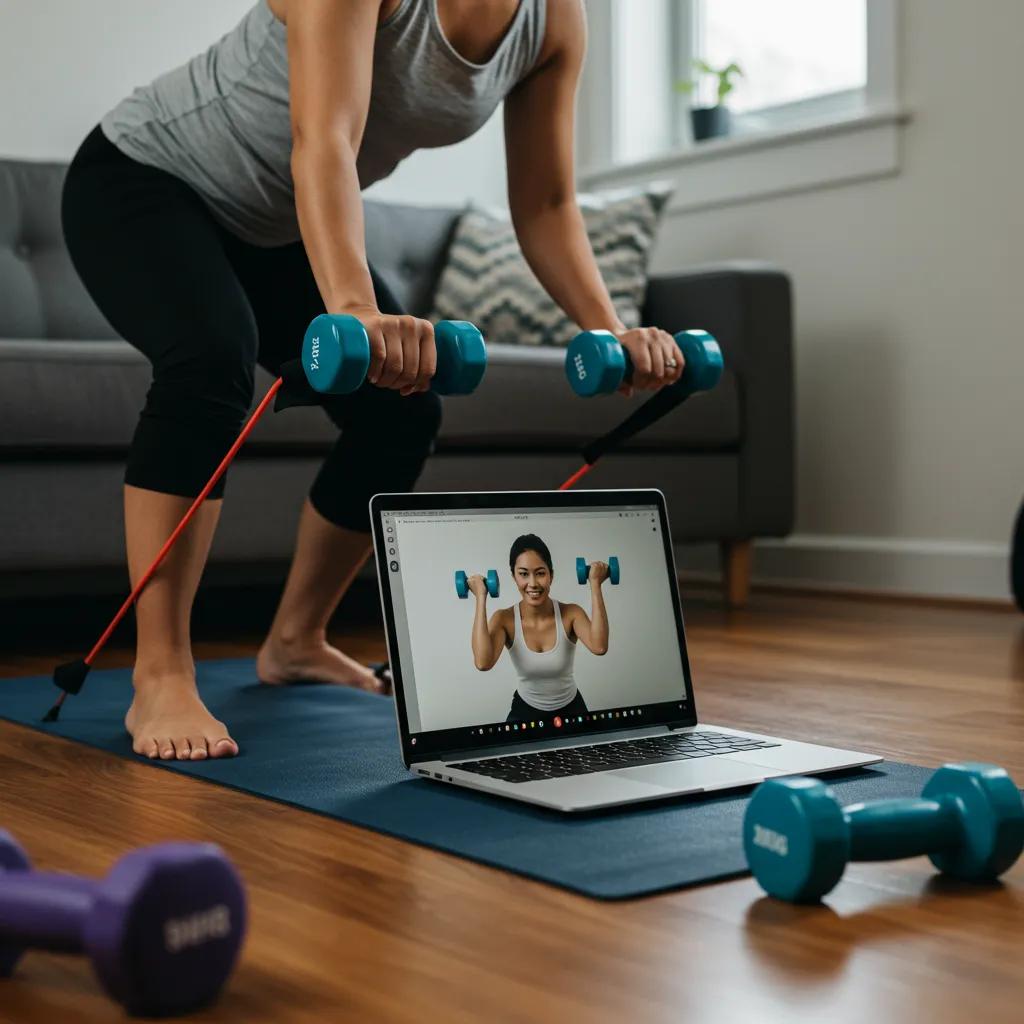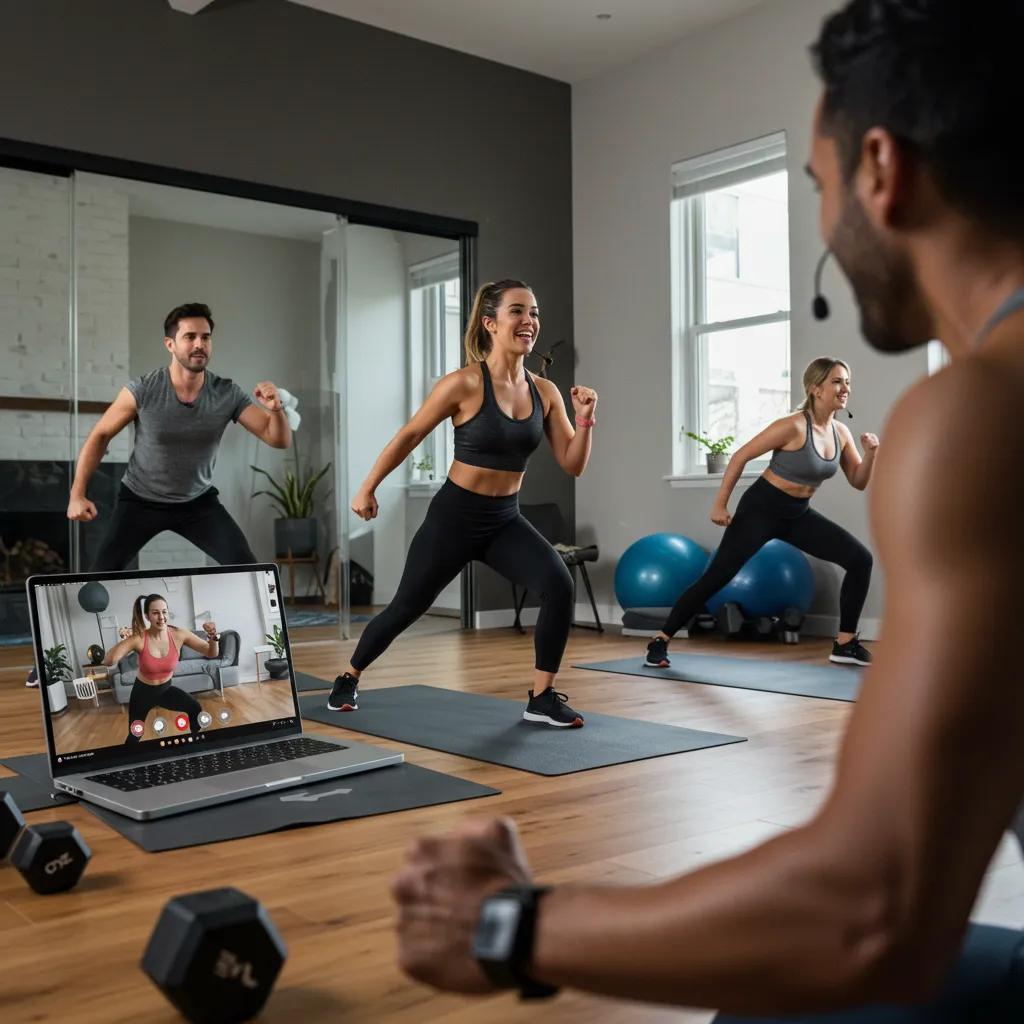
Newtown residents increasingly embrace remote coaching to align personalized fitness and nutrition within busy lifestyles. By merging virtual personal training with tailored diet guidance and small group personal training, this approach resolves scheduling conflicts, sustains motivation, and fosters community support—all without stepping outside the home. In this guide, you’ll discover (1) key benefits of remote coaching, (2) the process and impact of virtual nutrition coaching, (3) how remote small group training builds accountability, (4) the synergy of integrating diet and group workouts, and (5) criteria for selecting the .
What Are the Key Benefits of Remote Personal Training for Newtown Residents?
Remote personal training delivers customized one-on-one fitness guidance via live video, combining expert instruction with at-home convenience. By eliminating commute times and facility fees, this service enhances consistency and cost-effectiveness while preserving professional oversight. For example, a working parent can complete strength or mobility sessions between calls, ensuring progress toward endurance or muscle-gain despite a busy schedule.
Remote personal training offers multiple advantages for personal training:
- Unmatched Flexibility that accommodates variable work or family commitments.
- Targeted Customization where workouts adapt to individual goals and available equipment.
- Enhanced Accountability through scheduled check-ins, progress metrics, and real-time feedback.
These benefits lay the foundation for deeper engagement and reliable goal achievement in .
A breakdown of core advantages and client : testimonials
| Benefit | Mechanism | Outcome |
|---|---|---|
| Flexibility | On-demand video sessions | Higher session adherence |
| Customization | Data-driven program adjustments | Optimized individual progress |
| Accountability | Scheduled performance reviews and milestone tracking | Sustained motivation and focus |
This overview clarifies how each attribute directly translates to measurable fitness improvements, leading into an assessment.
How Does Remote Coaching Offer Flexibility and Convenience in Newtown?

Remote coaching offers flexibility by enabling workouts to fit any schedule and location, bypassing gym hours and traffic. Trainers leverage virtual platforms to adjust session times instantly, allowing participants to exercise before work, during lunch breaks, or late evenings. This convenience reduces barriers to consistent training and supports diverse routines—from travel days to remote work setups. By eliminating geographic constraints, also grants access to specialized expertise otherwise unavailable locally, paving the way for truly personalized fitness journeys.
Research suggests that while flexible training can be effective for remote trainees, adherence may decrease over time due to remote coaching.
In What Ways Are Workouts Customized for Individual Fitness Goals?
Workouts in achieving your goals begin with a detailed goals assessment, which informs exercise selection, intensity, and frequency based on each client’s needs. Trainers integrate biometric data, self-reported fitness levels, and equipment availability to craft adaptive programs that evolve with progress metrics. For instance, strength-focused clients receive progressive overload routines, while endurance goals trigger interval-based cardio sessions. Ongoing data collection—from workout logs to wearable feedback—enables real-time adjustments, ensuring every session aligns with evolving objectives and minimizes .
How Does Remote Coaching Enhance Accountability and Motivation?
Accountability in remote coaching stems from regular live check-ins, automated progress reports, and milestone celebrations that reinforce commitment. Virtual platforms allow trainers to monitor adherence through performance dashboards, sending reminders for upcoming sessions and tracking key metrics like heart-rate trends. Peer support features, such as group message boards, further boost motivation by sharing successes and challenges. Together, these elements create a support ecosystem that sustains engagement and drives continuous improvement in .
How Does Virtual Nutrition Coaching Support Newtown Residents’ Health Goals?
Virtual nutrition coaching in nutrition coaching delivered remotely by certified nutrition professionals. Through an initial assessment—covering eating habits, health history, and lifestyle factors—coaches develop tailored meal plans that address weight management, performance fueling, or general wellness. Ongoing virtual consultations, habit-tracking tools, and feedback loops ensure dietary strategies adapt to individual progress and preferences, promoting sustainable behavior change rather than .
The pervasive nature of poor diet and physical inactivity highlights the need for accessible health interventions, with technology offering promising solutions.
What Is the Process of Virtual Nutrition Coaching in Newtown?
The process begins with a comprehensive intake that analyzes dietary patterns and health objectives, followed by the creation of a customized plan that outlines macronutrient targets, meal timing, and food choices. Clients receive weekly check-ins via video or messaging to review logs, address challenges, and refine strategies. Nutrient-tracking apps integrated with the coach’s facilitate real-time adjustments, fostering accountability and data-driven refinements that drive measurable improvements in energy levels, body composition, and .
How Are Personalized Meal Plans Tailored to Individual Needs?
Meal plans adapt to personal factors like dietary restrictions, cultural preferences, and daily schedules. Coaches employ behavior-change techniques—such as goal setting and mindful eating prompts—to encourage adherence. For example, vegetarian clients receive plant-based protein swaps while shift-workers benefit from modular snack packs that maintain stable energy. By continuously analyzing feedback and biometric data (e.g., weight trends, blood sugar readings), iteratively refine meal recommendations to optimize.
What Role Do Registered Dietitians Play in Remote Nutrition Coaching?
Registered dietitians bring medical-nutrition expertise to remote coaching, ensuring plans are evidence-based and safe for individuals with chronic conditions. They interpret lab reports, manage nutrient-drug interactions, and offer specialized protocols for goals like diabetes management or remote coaching. Their professional oversight elevates virtual coaching beyond generic advice, instilling confidence that every recommendation aligns with best-practice guidelines and personal health considerations.
How Does Small Group Training Help Achieve Fitness Goals Remotely in Newtown?

Remote small group of in-person classes with the accessibility of virtual platforms. By capping sessions at 4–8 participants, this format delivers personalized attention while fostering peer encouragement. Trainers lead synchronized workouts via video conferencing, adapting movements for varied fitness levels and home-based equipment. The shared experience motivates consistency, challenges individuals through friendly competition, and leverages social bonds to reinforce commitment to .
What Are the Benefits of Virtual Small Group Fitness Classes?
Virtual classes promote accountability by scheduling fixed group sessions where attendance and performance matter. They build community through interactive features—such as on-screen leaderboards and chat functions—that encourage social support. Cost-efficiency arises from shared coaching time, making expert instruction more accessible. By balancing personalization with group energy, participants enjoy both expert feedback and small group personal training that drive long-term adherence.
How Does Small Group Training Foster Accountability and Consistency?
Accountability emerges from collective : participants sign up for a set schedule and receive automated attendance reminders. In-session check-ins allow trainers to monitor form and progress, while post-class recaps highlight individual achievements. Peer recognition for milestones—like hitting rep targets—reinforces positive behavior. This combination of structured scheduling and communal reinforcement sustains motivation and reduces dropout rates in personal training environments.
How Are Workouts Structured for Small Groups in Remote Settings?
Workouts follow a modular design: warm-up, skill drills, main workout, and cool-down, each timed to fit group pacing. Trainers demonstrate movements live, then observe participants’ form via webcams, offering corrections and modifications. Equipment requirements are kept minimal—resistance bands, dumbbells, or bodyweight—ensuring broad participation. Session templates rotate focus areas (strength, cardio, mobility) weekly, providing balanced programming that addresses diverse fitness goals within a program.
What Makes Integrating Nutrition and Small Group Training Effective in Remote Coaching?
Combining with small group workouts creates a holistic wellness ecosystem where dietary and exercise interventions reinforce each other. When meal plans align with energy demands of scheduled group sessions, clients experience enhanced performance and recovery. Shared nutrition challenges—such as group meal photo logs—foster community accountability, while collective fitness achievements motivate dietary adherence, yielding synergistic health improvements.
How Does Combining Nutrition and Training Improve Overall Wellness?
This integrated approach ensures energy intake matches training intensity, reducing fatigue and optimizing muscle repair. Clients report higher satisfaction when dietary guidance supports group workout schedules, leading to consistent attendance and improved body composition. The interplay of communal support in both meal accountability and nutrition coaching cultivates sustainable lifestyle changes that extend beyond isolated interventions.
What Are the Synergistic Effects of Integrated Remote Coaching?
Synergy arises when data from nutrition tracking informs workout programming—adjusting load or intensity based on caloric balance—and when fitness feedback guides to address recovery needs. This bidirectional data flow creates a personalized feedback loop that accelerates progress, minimizes plateaus, and enhances psychological engagement through measurable, interconnected nutrition coaching.
How Can Newtown Residents Choose the Right Remote Coaching Program?
Selecting an ideal program involves evaluating coach credentials, technology platforms, and local relevance. Certified trainers should hold recognized qualifications (e.g., ACSM, NASM) and registered dietitians should possess accreditation from leading bodies. Platforms must offer secure, user-friendly interfaces with integrated tracking tools. Finally, choose understanding—through localized success stories or group cohorts—to ensure cultural fit and sustained engagement.
What Credentials and Experience Should You Look for in Remote Coaches?
Seek coaches with certification from reputable organizations and documented experience in virtual training. Verified client reviews and case studies that reference measurable outcomes signal reliability. Nutrition professionals should hold credentials from recognized dietetic associations and demonstrate expertise in methodologies.
How Important Is Local Understanding and Community Connection?
Coaches familiar with ’s lifestyle—local food sources, common time constraints, and cultural preferences—can tailor plans more effectively. Community-focused that group local residents help foster shared accountability and mutual encouragement, strengthening adherence and satisfaction.
What Technology and Platforms Are Used for Effective Remote Coaching?
Effective programs deploy secure video-conferencing tools, integrated nutrition-tracking apps, and performance dashboards. Platforms that sync wearable data (heart rate, steps) with training logs enable real-time adjustments. with automated reminders, progress charts, and group chat functionalities maximize engagement and simplify adherence to both workout and nutrition coaching.
Summarizing these strategies, remote coaching in brings flexibility, expert guidance, and communal motivation to fitness and nutrition goals. By weaving together personalized virtual training, tailored meal planning, and small group dynamics, residents enjoy a cohesive pathway to long-term health and performance. Evaluate credentials, technology usability, and local relevance to select a program that aligns with your lifestyle and objectives—then embark on a sustainable journey toward wellness and community support.
Frequently Asked Questions
What types of technology are essential for effective remote coaching?
Effective remote coaching relies on a combination of secure video conferencing tools, nutrition-tracking applications, and remote coaching. These technologies facilitate real-time communication between coaches and clients, allowing for immediate feedback and adjustments.
Additionally, platforms that integrate wearable device data, such as heart rate monitors and fitness trackers, enhance the coaching experience by providing comprehensive insights into a client’s performance and progress. User-friendly interfaces with features like automated reminders and progress charts further improve engagement and adherence to fitness and nutrition plans.
How can remote coaching accommodate different fitness levels?
Remote coaching is designed to cater to a wide range of fitness levels by offering personalized workout plans that adapt to individual capabilities. Coaches assess each client’s current fitness level and goals, then create tailored workout plans that include modifications for various exercises. This ensures that beginners can safely participate while more advanced clients are challenged appropriately.
Additionally, sessions allow for peer support and motivation, fostering an inclusive environment where everyone can progress at their own pace.
What are the common challenges faced in remote coaching, and how can they be overcome?
Common challenges in remote coaching include maintaining motivation, ensuring accountability, and managing technology issues. To overcome these, coaches can implement regular check-ins, set clear goals, and utilize progress tracking tools to keep clients engaged. Establishing a supportive community through group sessions or online forums can also enhance motivation. Additionally, providing technical support and clear instructions for using platforms can help clients navigate any technology-related hurdles, ensuring a smoother remote coaching.
How does remote coaching address dietary restrictions and preferences?
Remote coaching takes dietary restrictions and personal preferences into account by conducting thorough assessments during the initial consultation. Coaches work with clients to understand their specific needs, such as allergies, cultural preferences, or lifestyle choices. This information is then used to create customized meal plans that align with individual goals while ensuring nutritional adequacy. Regular feedback and adjustments based on client experiences further enhance adherence and satisfaction with the provided.
What role does community play in remote coaching success?
Community plays a crucial role in the success of fitness coaching by fostering a sense of belonging and support among participants. Engaging in small group training or community challenges encourages accountability and motivation, as clients share their experiences and celebrate each other’s achievements. This social interaction can help reduce feelings of isolation often associated with remote workouts, making it easier for individuals to stay committed to their fitness and nutrition goals. A strong community enhances the overall coaching experience and promotes long-term adherence.
Can remote coaching be effective for rehabilitation or injury recovery?
Yes, remote coaching can be effective for rehabilitation and injury recovery, provided that the coach has the appropriate expertise. Coaches can design specialized programs that focus on safe exercises tailored to the client’s recovery needs. Regular communication allows for adjustments based on the client’s progress and any feedback regarding pain or discomfort. Additionally, remote coaching can provide the necessary remote coaching and motivation during the recovery process, helping clients stay engaged and committed to their rehabilitation goals.
Conclusion
Embracing remote coaching empowers Newtown residents to achieve their fitness and nutrition goals with unparalleled flexibility and expert guidance. This innovative approach combines personalized training, tailored meal plans, and community support, ensuring a holistic path to wellness. By evaluating credentials and technology, you can select a program that aligns with your lifestyle and aspirations. Start your journey towards sustainable health and community engagement today.

